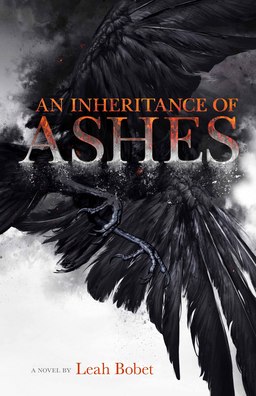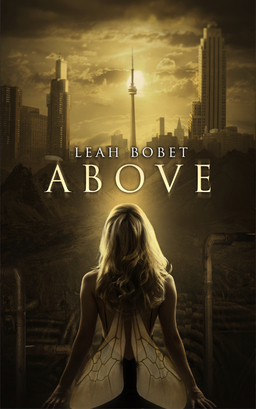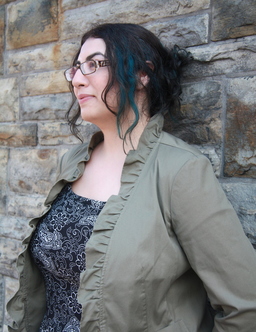Wordsmiths: An Interview with Leah Bobet
 Greetings, folks! As an addition to my reviews at Black Gate, I will be occasionally interviewing some of the authors and editors I talk about (if I’m lucky enough to know them, or they’re gracious enough to agree). I’m fascinated with the idea of getting into the mind of creative people, and some of the best conversations I have in my day-to-day are with other writers, so I’m hoping to capture some of that insight in this “Wordsmiths” series.
Greetings, folks! As an addition to my reviews at Black Gate, I will be occasionally interviewing some of the authors and editors I talk about (if I’m lucky enough to know them, or they’re gracious enough to agree). I’m fascinated with the idea of getting into the mind of creative people, and some of the best conversations I have in my day-to-day are with other writers, so I’m hoping to capture some of that insight in this “Wordsmiths” series.
My inaugural interview is with Leah Bobet, whose novel An Inheritance of Ashes I reviewed last week. Here’s a short bio, courtesy of the Can*Con 2016 website:
Leah Bobet is a novelist, editor, and bookseller with Bakka-Phoenix Books, Canada’s oldest science fiction bookstore. Her novels have won multiple awards, with her most recent, dustbowl literary fantasy An Inheritance of Ashes, receiving the Prix Aurora Award, the Sunburst Award, the Copper Cylinder Awards, and an Ontario Library Association 2015 Best Bets selection and being shortlisted for the Canadian Library Young Adult Book Award and the Cybils.
Leah lives and works in Toronto, where she makes a lot of jam, knits sweaters, and is learning game design. Visit her at www.leahbobet.com.
I hope you enjoy!
I have to get this out of the way immediately — this novel is absolutely friggin’ awesome. One of its greatest elements (in my opinion) is the vividness of the world you’ve created. Did anything particular inspire it?
First off: Hey, thank you! That’s always incredible to hear!
There were a few definite inspirations that went into the world of An Inheritance of Ashes. The first? Well, non-player characters.
I’ve always been interested in the people to the side of the stories we know: The scullery maids who are still washing dishes when the princess-in-hiding is elevated to her rightful place; the guy who does the cooking on the spaceship; the family of that trusted lieutenant who falls in battle. I like NPCs; I want to know about their subjectivities, and their lives. I want to know what being brushed by an epic story does to the lives of regular people. And, years ago, I got to wondering about whether Campbell’s Hero’s Journey and the arc of the epic fantasy novel — farm boy to hero — could be reversed. What did hero-to-farm boy look like? Could that even be a story?
Which meant, well, I needed a farm to try it out with.
So I drew on a few things in building Roadstead Farm and the post-war landscape of An Inheritance of Ashes. I don’t honestly remember when I decided to place Roadstead Farm and its neighbours beside the ruins of a post-apocalyptic Detroit River. But placing Roadstead Farm in Detroit meant the real-world Detroit, Windsor, and area had a huge influence on the book’s world. A lot of the research that went into worldbuilding was on crop zones, supply lines, and the kind of equipment and manpower you need to be able to have various pieces of machinery or processed food. I spent a whole week of research on whether the farm could have sugar (including recalculating crop zones after a few degrees of global warming had been through!). So much of the texture of the farm, their chores, and their limitations was shaped by that background work.
More importantly, I designed Windstown and the region’s population based on the actual demographics of who’s living there now, which meant Italian, Hmong, Black, Arab, and Hispanic families were an integral part of the town’s life. It’s a multi-religious neighborhood, shaped by the kind of creative urban gardening and community-building solutions that the people working to shift Detroit’s economy are already using now.
So I could say my biggest inspirations for the world of An Inheritance of Ashes were the cities of Windsor and Detroit themselves: What they are now, and what they might become in a century if everything broke tomorrow.
 That’s an impressive amount of research — but it definitely shows! So I’m getting the sense you’re a gamer of some sort — RPGs? Possibly with dice rolling?
That’s an impressive amount of research — but it definitely shows! So I’m getting the sense you’re a gamer of some sort — RPGs? Possibly with dice rolling?
Yup, I am! The great thing about being a nerd born of a nerd is that we had an Atari when I was two or three years old, and I’ve played console, PC, and board games from way back, with the occasional tabletop group thrown in. I’m kind of in love with what you can do, in terms of storytelling, around a gaming table or with a middleware program like Twine or Ren’py: interactivity changes everything in how a story lands, and it can make for some of the most powerful work around.
And definitely interactivity between the characters themselves — which I found was a huge part of Inheritance, since a lot of the tension comes down to interactions between specific characters. That said, I hear a lot of writers criticize plots that exist because two characters don’t talk to each other. Were you worried about that kind of criticism with Hallie and Marthe?
Interestingly enough — since I’m one of those readers who does get frustrated by plots that hinge on not communicating — I wasn’t worried about that at all.
To delve into craft for a minute (whee!) I have a suspicion that when readers point out that fault in a work, they’re pointing out situations where the writer’s put an artificial barrier between two people to create conflict–when there’s no reason for two people not to talk and clear up the misunderstanding between them, which will make everything immediately fine. Without giving too much away, in Hallie and Marthe’s case, the barrier between them is one of the primary antagonists of the novel, and it’s very real; it came from events and circumstances that they both fear and hate and wish they were rid of. Neither of them are acting against their nature: they’re both battering at that wall between them desperately for most of the novel, and trying so hard to do and say the things that will make that barrier go away.
So: I think we have to be careful with how literally we take our writing advice, sometimes. Writing advice is generally about craft, rather than content. A lot of writing advice is, to me at least, less a set of rules than tools and methods to call us to be rigorous; to not take shortcuts, to not be sloppy, to commit absolutely to the realism of the people and places we create, even when they’re fantastical. Especially when they’re fantastical!
Well said — and unfortunately a lot of writing advice I hear is spoken as the be-all-to-end-all. Given all of that, would you describe Hallie as a reliable narrator?
That’s an interesting question! I think she’s a reliable narrator insofar as she’s not hiding anything: She reports exactly what she sees and hears. The thing is, because of the things that scare her, the way people have modeled love for her, and the world she lives in, she sometimes draws the wrong conclusions about why other people do what they do, or what might help them.
Which… I suppose makes her human. There’s a degree to which we all do this: interpret the world through the filters of our own experiences, biases, and data. She’s as reliable as any of us are. I think the best thing about her, though, is that she’s growing.
And that realism and growth isn’t limited to Hallie — characters throughout Inheritance go through some form of growth, including Marthe, Heron, Tyler, and their neighbors in town. There’s this distinctive community feel to the entire story, as well, but also a resistance to authority. Were there any particular messages or meanings you were trying to convey with those elements, or was your focus on awesome storytelling?

I’m always a little leery of the binary we draw between fun and excellent storytelling and message fiction (she said, demonstrating that resistance to authority). It’s so common, and yet there are so many weird ideas packed into it: That talking about something important must by necessity be boring; that meanings take a lecture format, author to reader; that fun has to be meaningless.
When I write, especially at novel length, I’m…sort of wrestling with God. Novels are my way of tackling questions I don’t think I can answer in less than 80,000 words. So I spend less time on either sending a message to an assumed reader or trying to entertain than, well, wrestling with the things that haunt or fascinate me: Why aren’t there stories about the bystanders in an epic war? How do you break a cycle of abuse? When someone who’s done wrong is in your power, what’s the appropriate way to act?
I don’t have the answers to those questions, so I explore; I don’t really want to tell other people what to do so much as show them my explorations. I try to make those explorations interesting. I believe very strongly in the intelligence of readers, especially young readers. We all have lively brains. We’re all curious people. I give readers my wrestling, and they’ll compare that with the world and draw their own conclusions, one by one.
Okay, that sort of addresses one of my other thoughts about Inheritance — that it didn’t feel like YA to me as I was reading it, despite Hallie’s age. Do you compare your novel against other dystopian YA looking for similarities and differences, or are you against that sort of comparison?
I think there’s maybe one point in a book’s life where it’s useful for an author to compare their own work to other books: When you’re thinking about who you might ask to read the book for a cover blurb. Knowing whose work shares something with your own — and whose readers might be interested in your book — really matters. But otherwise, assuming one is writing their own book, the one that matters to them: Comparison is a great way to drive yourself crazy for no real reason.
Every novel — and writer — is unique in their own way. We each speak in our own voice. And while schools of thought are definitely a thing, as are schools of style or broad movements, we’re each ultimately going to write the book we’re going to write, the book of our own heart. Comparing your own heart to other people’s doesn’t really get one too far. There’s a reader for every book out there, and a book for every reader. The trick is less ranking oneself against other people’s work, but devoting that energy to finding the reader who’s out there waiting for you.
So when you were trying to find a home for Inheritance, did you avoid the logline format we’re all told to do, like “It’s a mix of Jim Butcher and J.J. Abrams, set in a dystopian fantasy?”
Because the book was sold on proposal — so, four chapters or so and a synopsis — to a Canadian publisher I’d already worked with and a U.S. editor I’d almost worked with before, the logline format didn’t really come into play. I do have an elevator pitch for the book, but it’s always been unwieldy and fluctuating, and I’ve only ever used it when describing the work to readers: The Canadian dustbowl fiction side of a David Eddings novel, or what everyone was doing in the Shire while Frodo did his thing with bonus monsters, or what happens when you take Eddings, Sinclair Ross, and Lovecraft and chuck them in a blender and hit the top hard.
Sort of As for Me and Cthulhu’s House? I tried to get Eddings in there and drew a blank… Anyway, this is the part where I ask, heart in my throat, if that relationship with your publisher and editor means we might see more from the world of Inheritance? (Fingers crossed for a yes)
It’s possible! I do have a companion book outlined, although the project I’m currently working on is completely separate. If there’s a desire for it, I would definitely revisit that world, and these characters.
Excellent! Anything you can say about your current project, or anything else you’d like to plug before we wrap this up?
I’m daunted by how ambitious it is and a little desperately in love with it, and I’m really hoping I can share it with everyone soon!
I just want to publicly thank Leah for an excellent interview (I’ve thanked her a bunch of times via email). If you want to find out more about An Inheritance of Ashes and Leah’s other work (her first novel, Above, was shortlisted for the Prix Aurora Award) check out www.leahbobet.com. And stay tuned for more in the “Wordsmiths” series in the New Year!
Our previous coverage of Leah Bobet includes:
Leah Bobet’s Above: A Review by Matthew David Surridge
In 500 Words or Less: An Inheritance of Ashes is Absolutely Friggin’ Awesome by Brandon Crilly
And now a word (or several) about Ideomancer by C.S.E. Cooney
An Ottawa teacher by day, Brandon has been published work in On Spec, Third Flatiron Anthologies, and elsewhere. His next short story, “Blaze-of-Glory Shoes,” will be published in The 2017 Young Explorer’s Adventure Guide on December 1. Learn more at brandoncrilly.wordpress.com or on Twitter: @B_Crilly